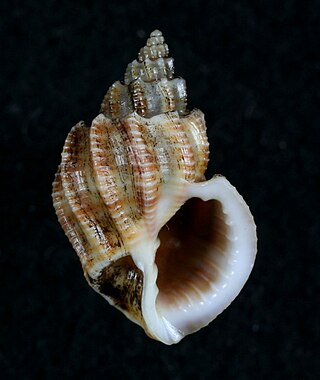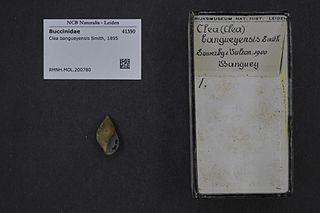
Anentome helena, common name assassin snail or bumblebee snail, is a species of freshwater snail with an operculum, an aquatic gastropod in the family Nassariidae, most of which are marine.

Clea is a genus of freshwater snails with opercula, aquatic gastropod mollusks in the subfamily Anentominae of the family Nassariidae, a family, almost all of the rest of which are marine.

Freshwater snails are gastropod mollusks that live in fresh water. There are many different families. They are found throughout the world in various habitats, ranging from ephemeral pools to the largest lakes, and from small seeps and springs to major rivers. The great majority of freshwater gastropods have a shell, with very few exceptions. Some groups of snails that live in freshwater respire using gills, whereas other groups need to reach the surface to breathe air. In addition, some are amphibious and have both gills and a lung. Most feed on algae, but many are detritivores and some are filter feeders.

Scalptia scalarina is a species of sea snail, a marine gastropod mollusk in the family Cancellariidae, the nutmeg snails.

Clea bangueyensis is a species of freshwater snail with an operculum, an aquatic gastropod mollusk in the family Buccinidae, the true whelks, most of which are marine.

Clea bockii is a species of freshwater snail with an operculum, an aquatic gastropod mollusk in the family Buccinidae, the true whelks, most of which are marine.
Clea broti is a Southeast Asian species of freshwater snail with an operculum, an aquatic gastropod mollusk in the family Buccinidae, the true whelks, most of which are marine.

Clea cambojiensis is a species of freshwater snail with an operculum, an aquatic gastropod mollusk in the family Buccinidae, the true whelks, most of which are marine.
Clea fusca is a species of freshwater snail with an operculum, an aquatic gastropod mollusk in the family Buccinidae, the true whelks, most of which are marine.

Clea hidalgoi is a Southeast Asian species of freshwater snail with an operculum, an aquatic gastropod mollusk in the family Nassariidae, most of which are marine.
Clea jullieni is a Southeast Asian species of freshwater snail with an operculum, an aquatic gastropod mollusk in the family Buccinidae, the true whelks, most of which are marine.

Clea nigricans is a species of freshwater snail with an operculum, an aquatic gastropod mollusk in the family Buccinidae, the true whelks, most of which are marine.
Clea paviei is a Southeast Asian species of freshwater snail with an operculum, an aquatic gastropod mollusk in the family Buccinidae, the true whelks, most of which are marine.
Clea spinosa is a species of freshwater snail with an operculum, an aquatic gastropod mollusk in the family Buccinidae, the true whelks, most of which are marine.
Clea wykoffi is a species of freshwater snail with an operculum, an aquatic gastropod mollusk in the family Buccinidae, the true whelks, most of which are marine.

Nassodonta is a genus of brackish water snails, gastropod mollusks in the family Nassariidae.
Clea funesta is a species of freshwater snail with an operculum, an aquatic gastropod mollusk in the family Buccinidae, the true whelks, most of which are marine.

The Ancillariidae is a taxonomic family of sea snails, marine gastropod molluscs in the superfamily Olivoidea. They are gastropods, which belong to the larger group of mollusks. This family is part of the superfamily Cypraeoidea, which includes cowries, a well-known group of sea snails.

Anentome is a genus of freshwater snails with opercula, aquatic gastropod mollusks in the subfamily Anentominae of the family Nassariidae, a family, almost all of the rest of which are marine.










